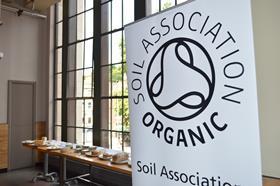
The case for continuing the ban on neonicotinoids was one of the hot topics at the 2014 Soil Association conference.
Professor Dave Goulson, of the University of Sussex, discussed what he claims is the mounting evidence of how bees and other wildlife are being quietly poisoned by the chemicals, which are understood to be 5,000 times more toxic than DDT.
He said: “[The toxicity of neonicotinoids] takes your breath away - just five maize seeds treated with neonicotinoids are enough to kill a grey partridge.”
Goulson also told those at the conference, which was held in Swindon from 8-9 October, that studies on neonicotinoids have overwhelmingly found negative effects on bumblebee colonies and behaviour – and the very same chemicals that are killing bees are still readily available in any garden centre.
He said: 'More research into the impacts and wider effects of neonicotinoids is necessary to prevent further damage to our waterways and soils. Equally, the time has come for policy makers to take note of the chilling evidence that face our pollinators and the wildlife that inhabits the British countryside.'
In addition to calls for an extension of the ban and more research on wider impacts of neonicotinoids, the conference, which was chaired by Farming Today’s Charlotte Smith, debated some of the biggest issues facing food and farming systems. Delegates heard a presentation from Professor Carlo Leifert of Newcastle University, who spoke about groundbreaking research on the nutritional value of organic crops.
Peter Bonfield, author of The Plan for Public Procurement, also discussed the English government food plan; Frank Strang of the Scottish Government spoke about the Scottish food plan; and Mike Clarke, of the Royal Society for the Protection of Birds, shared ideas on how a future government could fix the UK's farming and food systems.
Speaking about the conference, Helen Browning, Soil Association chief executive, said: 'The topics covered at this year’s conference highlighted that tackling climate change, the most critical challenge of our time, could also deliver against the other big challenges we face, such as the huge issues in public health, the dramatic declines in biodiversity and depletion of resources like phosphate and soils.
'We must remember that there are many opportunities to make lives healthier and happier, while caring for nature too, and we must continue to work together to give government a mandate to provide joined up frameworks which will ensure people and businesses have the incentives to do the right things.”



